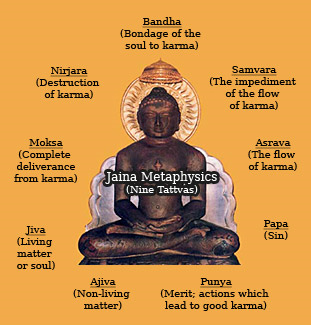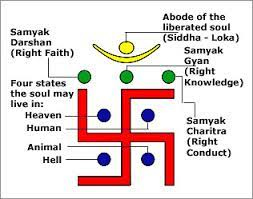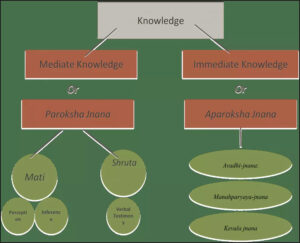Jainism believes in the plurality of souls and not in the existence of God. It holds that there are as many souls as there are living beings. They also accept the existence of souls even in animals and plants, with degrees of difference in the level of consciousness. They believe that every soul can attain infinite consciousness, power, and happiness by removing all Karmas or bondages.
Jainavenue is a medium to serve the spiritual path of Jainism


According to Jainism Nirvana or liberation is obtained through three jewels (Tri Ratna):
- Right Philosophy.
- Right Knowledge.
- Right Conduct.
Right Conduct implies 5 abstinences (things we should not do):
- Not to lie.
- Not to steal.
- Not to strive for luxury and possessions.
- Not to be unchaste.
- Not to injure (Ahimsa).
Ahimsa is a vital principle of Jainism. Jainism does not accept the idea of a creator of the world. Every living being in this world is equally precious. Therefore no one is superior to the other, and no one has the right to harm others. Even mankind does not have the right to harm an insect.
Jainism emphasizes Syat-vada‘ which lays the mind open to the truth coming from any side. No opinion about the truths can be an absolute, as opinions can be both right and wrong. This generates tolerance and regard for everyone’s viewpoints. In the theory of knowledge, Jainism accepted three sources of getting real knowledge, namely perception, inference, and testimony.
Nine Tattvas (Principles) of Jainism:
The nine tattvas, or principles, are the single most important subject of Jain philosophy. It deals with the karma theory of Jainism, which provides the basis for the path of liberation. Without the proper knowledge of this subject, a person cannot progress spiritually. The proper understanding of this subject brings about right faith (samyak-darshana), right knowledge (samyak-jnana), and right conduct in an individual.
- Jiva – soul or living being (Consciousness).
- Ajiva – non-living substances.
- Punya – result of good deeds.
- Pap – result of bad deeds.
- Asrava – cause of the influx of karma.
- Bandha – the bondage of karma.
- Samvara – Stopping of the rise of karma.
- Nirjara – Removal of the accumulated karma.
- Moksha – Total freedom from karma.

Practical teachings of Jainism:
- Ahimsa (Non-violence) is the foremost virtue in Indian thought but in Jainism it requires distinct meaning and depth; it is non-violence in word, thought and deed.
- Emphasizing the individualistic aspect, Jainism emphasizes on the development of personality as the final aim. Jain teachings are social and tolerant and believes in happiness of all.
- By undertaking these wholesome activities, we acquire punya or good karmas. Such activities are providing food or other items to the needy people, doing charity work, propagating religion, etc. When punya matures, it brings forth worldly comfort and happiness. Digambar consider “Punya” as part of Asrava.
- By undertaking bad activities, we acquire pap or bad karmas. Such activities are: being cruel or violent, showing disrespect to parents or teachers, being angry or greedy and showing arrogance or indulging in deceit. When pap matures, it brings forth worldly suffering, misery, and unhappiness. Digambar consider “Pap” as part of Asrava.
- There are two levels of discipline depending on the severity of the vows which are different for the monks and of lay life.
- The aim of life is to get oneself free from Soul united with karma is called a soul in bondage and is to be redeemed and freed.
- Moksha means dissolution of partnership between soul and matter, restoring the ideal character of the spirit.
- Jainism rejects God as the creator of this world, as a need to create the world would be inconsistent with his necessary perfection, Jainism looks upon man himself as God when his inherent powers are fully in bloom.
- Jains views are both relativistic and pluralistic as it recognizes spirit and the material objects.

Educational Implications:
- Truth is relativistic and pluralist. What is true to some may not be true for others. Knowledge, therefore, may be viewed differently. Students must be taught to view things in different perspectives. They should be open-minded and be willing to accept different opinions.
- Self-realization is Man must focus on divinity and remove the material bond of the soul. Therefore, students should be taught to focus on developing their spiritual side, and not focus on material things.
- Education should lead to self-enlightenment. Students should not study for the sake of marks or good report They should study to broaden their mind and broaden their thinking. Studying should be for the sake of gaining new knowledge and developing oneself.
- Development of personality as an individual. Hence, schools should stress individual aims and ambitions. The Common Curriculum should be removed, and individualized curriculum and courses should be provided to students based on their personal needs and interests.
- Students should develop spiritual knowledge and a feeling of sympathy and empathy for life. Subjects like Bible Studies, Moral Studies, SUPW, etc. focus on spiritual aspects while subjects like Environmental Education, Human Rights Education, help develop empathy and encourage social work.
- Students must realize their own shortcomings and bad behaviors. Students should abstain from bad habits that they may have learned from bad They should be given the motivation to remove those bad behaviours and replace them with good ones.
- Education should develop in students the sense of discrimination between what is good and what is bad.
- Education should inculcate non-violence as a virtue, practiced and not only aspired for, but that would also be socially The teaching of nine principles called as nine categories of Jainism to dissolve the partnership between soul and matter.
Curtesy : Article take from – https://mzu.academia.edu/MikaelChuaungo on 1/feb/22
About Author
Mr. Mikael Chuaungo is an assistant Professor, Department of Education. Govt. J.Buana College, Lunglei, Mizoram, India. He is pursuing PhD on Constructive Pedagogy in Secondary Education.


